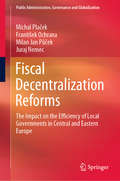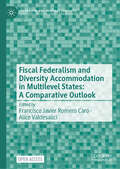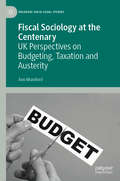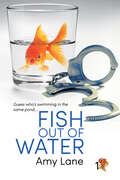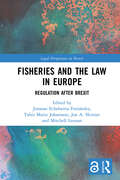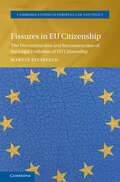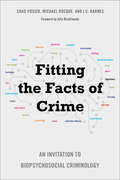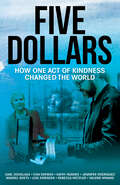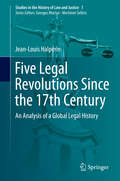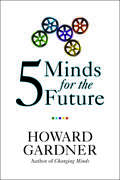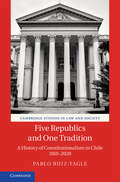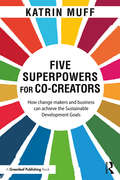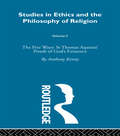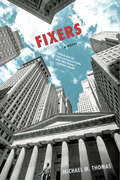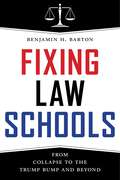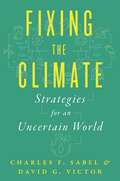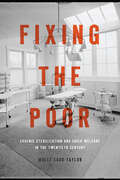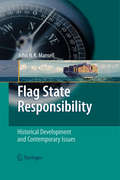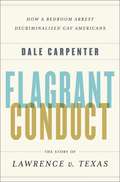- Table View
- List View
Fiscal Decentralization Reforms: The Impact on the Efficiency of Local Governments in Central and Eastern Europe (Public Administration, Governance and Globalization #19)
by Juraj Nemec Michal Plaček František Ochrana Milan Jan PůčekThis book examines the impacts of fiscal decentralization reforms on the efficiency of local governments in Central and Eastern European (CEE) countries. By offering a comparative perspective and by applying econometric methods and regression models, it analyses various reform trajectories and their effects on individual CEE countries. Furthermore, the book discusses input and output indicators for evaluating the efficiency of municipalities. Readers will learn about the common features of these countries, the impact of path dependence, and future prospects for decentralization reforms. In closing, the book discusses modern management and administration methods, opportunities for cooperation between municipalities, co-creative service delivery, and other measures that could improve the efficiency of public service provision.
Fiscal Federalism and Diversity Accommodation in Multilevel States: A Comparative Outlook (Federalism and Internal Conflicts)
by Alice Valdesalici Francisco Javier Romero CaroThis open access edited book connects two strands of federal studies, fiscal federalism, and diversity accommodation, to answer two closely interrelated questions. The first of these is to what extent has the need to accommodate diversities determined financial relations and their evolution? The authors answer this question by conducting a thorough investigation of the types of diversity that drive such evolution. The second question is does fiscal federalism have a broadly positive or negative impact on the accommodation of diversities, by producing institutional solutions that either integrate a federal system or pull it apart? Through contributions from experts in law, economics, and political science, the book uses a series of case studies to establish a theoretical framework for exploring the relationship between fiscal federalism and diversity accommodation. The authors lay the groundwork for a comparative study of this relationship in multilevel states.
Fiscal Sociology at the Centenary: UK Perspectives on Budgeting, Taxation and Austerity (Palgrave Socio-Legal Studies)
by Ann MumfordThis book discusses the socio-legal tax state and its relationship to development, inequality and the transnational. 'Fiscal Sociology' commenced in 1918 when Joseph A. Schumpeter examined the links between capitalism and taxation, arguing that fiscal pressures on governments led directly to the development of tax collection, and the burgeoning growth of capitalist economies. The identification of taxation as an important component of capitalism has continued to change the way that theoretical sociologists conceptualise tax. This book documents the history of this literature to provide a summary of the topic for scholars seeking a bridge between taxation law and contextual, historical, and anthropological analyses of the development of the state, more generally. Whilst Schumpeter’s insights have been celebrated over the past one hundred years, taxation has slipped from the agenda of many scholarly disciplines, in relation to analyses of poverty, globalisation, and equality. Fiscal Sociology at the Centenary fills this gap. The implications of this literature for taxation law in the United Kingdom, in particular, are considered.
Fish Out of Water (Fish Out of Water #1)
by Amy LanePI Jackson Rivers grew up on the mean streets of Del Paso Heights--and he doesn't trust cops, even though he was one. When the man he thinks of as his brother is accused of killing a police officer in an obviously doctored crime, Jackson will move heaven and earth to keep Kaden and his family safe. Defense attorney Ellery Cramer grew up with the proverbial silver spoon in his mouth, but that hasn't stopped him from crushing on street-smart, swaggering Jackson Rivers for the past six years. But when Jackson asks for his help defending Kaden Cameron, Ellery is out of his depth--and not just with guarded, prickly Jackson. Kaden wasn't just framed, he was framed by crooked cops, and the conspiracy goes higher than Ellery dares reach--and deep into Jackson's troubled past. Both men are soon enmeshed in the mystery of who killed the cop in the minimart, and engaged in a race against time to clear Kaden's name. But when the mystery is solved and the bullets stop flying, they'll have to deal with their personal complications... and an attraction that's spiraled out of control.
Fisheries and the Law in Europe: Regulation After Brexit (Legal Perspectives on Brexit)
by Jonatan Echebarria FernándezExamining fisheries, Brexit, the Trade and Cooperation Agreement (TCA) and its consequences for the Fishing Industry in the UK and the EU, this book explores key issues within the complex topic of fisheries after Brexit. Assessing the new fishing relationship between the UK and the EU, which will continue to develop over the next decade, it provides an important study of the state of fisheries post-Brexit. Taking a cross-cutting economic, legal and policy approach, the book outlines the social and economic impacts of Brexit on the UK and EU fishing industries. It critically analyses the provisions relevant to fisheries in the TCA, reflects on the bilateral fishing negotiations between the EU, UK and Norway, providing inferences as to what the "new and special relationship" might be in fisheries. It then focuses on the 2020 Fisheries Act and explores internal divergences in the nations of the UK because of devolution. Taking an international approach, the work offers an exploration of cooperation in fisheries enforcement, international and regional obligations in marine conservation, and the new horizons for the UK in international fisheries organizations and arrangements now it is no longer a member of the EU. It offers an overview of expert opinion on fisheries post-Brexit, highlighting lessons learned and future developments for fisheries in a post-Brexit world. Having finally signed the Trade and Cooperation Agreement on 31 December 2020 after tense negotiations, the United Kingdom and European Union have found themselves in a new fisheries relationship. This book maps the complex social, economic, legal and policy issues of fisheries in a post-Brexit world and will be of interest to stakeholders and scholars.
Fisher�s Techniques of Crime Scene Investigation First International Edition
by William J. Tilstone Michael L. Hastrup Camilla HaldBarry Fisher‘s Techniques of Crime Scene Investigation has long been considered the "bible" of the crime-solving profession, drawing from the author‘s 40-year career in forensic science, including his time spent as the crime laboratory director for the Los Angeles County Sheriff‘s Department. Now for the first time, com
Fishing Power Europe: The EU’s Normativity in Its External Fisheries Action (Global Europe: Legal and Policy Issues of the EU’s External Action #3)
by Mihail VatsovThis book examines how the EU and international law frameworks impact the EU’s ability to act normatively in its external action in the area of fisheries. The EU, a major fishing power, portrays itself as a normative actor and a champion of sustainable fishing. The volume reconceptualises the Normative Power Europe narrative by identifying three interrelated elements – universality, use of instruments, and legitimacy – as the key criteria against which to evaluate the normativity of the EU’s conduct. The universality element examines the level of international acceptance of the stated aims of EU action; the use of instruments element examines the EU’s participation limitations in relevant international institutions and the means (persuasion as opposed to coercion) through which it acts; and the legitimacy element examines the substance of the EU’s action in terms of legality, protection of common or self-interests, and coherence and consistency. The book draws upon extensive research into both the international and EU legal frameworks relating to fisheries and the EU’s practice in its external fisheries relations. It consecutively discusses four sets of challenges: (i) to the EU’s normativity posed by lack of membership in global institutions; (ii) created notwithstanding membership in other global or regional bodies; (iii) connected to multileveled coercive action and (iv) to accessing foreign fishing resources. It claims that, while the EU’s normativity depends greatly on its internal and external powers, it is the EU’s inability to freely wield these powers that damages its normativity. To act normatively, the EU primarily needs the full Member States’ support, as its present constitution prevents it from acting completely independently from them. The volume is aimed at academics and practitioners alike working in the area of fisheries globally but also on the EU’s external action more generally. Mihail Vatsov is Programme Manager with the European Commission in Brussels, Belgium.
Fissures in EU Citizenship: The Deconstruction and Reconstruction of the Legal Evolution of EU Citizenship (Cambridge Studies in European Law and Policy)
by Martin SteinfeldThis book argues that core concepts in EU citizenship law are riddled with latent fissures traceable back to the earliest case law on free movement of persons, and that later developments simply compounded such defects. By looking at these defects, not only could Brexit have been predicted, but it could also have been foreseen that unchecked problems with EU citizenship would potentially lead to its eventual dismantling during an era of widespread populism and considerable challenges to further integration. Using a critical constructivist approach, the author painstakingly outlines the 'temple' of citizenship from its foundations upwards, and offers a deconstruction of concepts such as 'worker', the role of non-economic actors, the principle of equal treatment, and utterances of citizenship. In identifying inherent fissures in the concept of solidarity and post national identification, this book poses critical questions and argues that we need to reconstruct EU citizenship from the bottom up.
Fit für den digitalen Wandel in Kommunen: Praxisratgeber für Personaler, Digitalisierungsverantwortliche und Führungskräfte (Edition Innovative Verwaltung)
by Christina WinnersVerwaltungen stehen vor der Frage, wie sie die Digitalisierung angehen sollen. Was sind die notwendigen Schritte? Worauf sollten sie besonders achten? Dieses Buch bietet für Verwaltungsvorstände, Digitalisierungsverantwortliche als auch Personalleitungen, Personalentwicklungen und Führungskräfte im Public Sector einen umfassenden Leitfaden, wie die aktuellen Veränderungsprozesse in der öffentlichen Verwaltung erfolgreich gestaltet werden können.In fünf Trends beschreibt Christina Winners die maßgeblichen Veränderungen, die durch die Digitalisierung auf die Verwaltung zukommen. Sie leitet ein neues Führungsverständnis ab, beschreibt ein geeignetes Change Management und stellt abschließend zehn Bausteine der Personalentwicklung zur erfolgreichen Gestaltung des digitalen Transformationsprozesses zur Verfügung. Anschaulich beschreibt sie die sieben Phasen des Veränderungsprozesses, die Mitarbeiter rational und emotional durchlaufen und gibt darauf aufbauend konkrete Empfehlungen für die Informationspolitik in Verwaltungen ab. Zahlreiche Anregungen für begleitende Veranstaltungen von Buddy-Systemen über Werkstatt-Gespräche bis kollegialen Beratungsgruppen zeigen, wie der Prozess begleitet werden kann. Bewährte Leitfragen für Workshops als auch Checklisten unterstützen bei der konkreten Umsetzung.Das Werk wird abgerundet durch Interviews mit Führungskräften und Mitarbeitenden von Generation Z bis Baby Boomern, die Stimmungen und Ideen zur anstehenden digitalen Transformation der Verwaltung beitragen.
Fitting the Facts of Crime: An Invitation to Biopsychosocial Criminology
by Chad Posick Michael Rocque J.C. BarnesBiosocial criminology—and biosocial criminologists—focuses on both the environmental and biological factors that contribute to antisocial behavior. Importantly, these two domains are not separate parts of an equation but pieces of the same puzzle that fit together for a complete picture of the causes of crime/antisocial behavior. Fitting the Facts of Crime applies a biopsychosocial lens to the “13 facts of crime” identified by John Braithwaite in his classic book, Crime, Shame and Reintegration. The authors unpack established facts—about gender and sex, age, environment, education, class, social bonds and associations, stress, and other influences—providing both empirical research and evidence from biopsychosocial criminology to address the etiology behind these facts and exactly how they are related to deviant behavior. With their approach, the authors show how biopsychosocial criminology can be a unifying framework to enrich our understanding of the most robust and well-established topics in the field. In so doing, they demonstrate how biological and psychological findings can be responsibly combined with social theories to lend new insight into existing inquiries and solutions. Designed to become a standard text for criminology in general, Fitting the Facts of Crime introduces key concepts and applies them to real-world situations.
Five Dollars: How One Act of Kindness Changed the World
by Eight AuthorsDiscover the transformative power of a single act of kindness in Five Dollars: How One Act of Kindness Changed the World. This heartwarming and inspiring novel follows the remarkable journey of a five-dollar bill as it travels through the hands of diverse individuals, sparking a global movement of generosity and compassion. From a struggling family man and a devoted parishioner to a reformed criminal and an elderly woman finding new purpose, each character's story weaves into a tapestry of interconnected lives. As small acts of kindness ripple outwards, they create profound change in communities, overcoming skepticism, resistance, and even corruption. Five Dollars is a testament to the enduring impact of human kindness and a powerful reminder that even the smallest gestures can unite us, transform lives, and create a brighter, more compassionate world. Join this extraordinary journey and be inspired to believe in the boundless potential of goodwill and the remarkable difference each of us can make.
Five Fast Pennies (Routledge Revivals)
by Ralph W. KetnerFirst published in 1994, Five Fast Pennies was written by the Co-Founder of Food Lion, Inc., Ralph W. Ketner, to tell the story of the challenges and opportunities he faced throughout his life and career. Accessibly written, the book provides a detailed insight into Ketner’s philosophy of "Five fast pennies instead of one slow nickel", his views on success, and his journey from childhood through to Co-Founder of Food Lion, Inc., and beyond.
Five Legal Revolutions Since the 17th Century
by Jean-Louis HalpérinThis book presents an analysis of global legal history in Modern times, questioning the effect of political revolutions since the 17th century on the legal field. Readers will discover a non-linear approach to legal history as this work investigates the ways in which law is created. These chapters look at factors in legal revolution such as the role of agents, the policy of applying and publicising legal norms, codification and the orientations of legal writing, and there is a focus on the publicization of law. The author uses Herbert Hart's schemes to conceive law as a human artefact or convention, being the union between primary rules of obligations and secondary rules conferring powers. Here we learn about those secondary rules and the legal construction of the Modern state and we question the extent to which codification and law reporting were likely to revolutionize the legal field. These chapters examine the hypothesis of a legal revolution that could have concerned many countries in modern times. To begin with, the book considers the legal aspect of the construction of Modern States in the 17th and 18th centuries. It goes on to examine the consequences of the codification movement as a legal revolution before looking at the so-called "constitutional" revolution, linked with the extension of judicial review in many countries after World War II. Finally, the book enquires into the construction of an EU legal order and international law. In each of these chapters, the author measures the scope of the change, how the secondary rules are concerned, the role of the professional lawyers and what are the characters of the new configuration of the legal field. This book provokes new debates in legal philosophy about the rule of change and will be of particular interest to researchers in the fields of law, theories of law, legal history, philosophy of law and historians more broadly.
Five Minds for the Future
by Howard GardnerWe live in a time of relentless change. The only thing that?s certain is that new challenges and opportunities will emerge that are virtually unimaginable today. How can we know which skills will be required to succeed?In Five Minds for the Future, bestselling author Howard Gardner shows how we will each need to master "five minds" that the fast-paced future will demand:· The disciplined mind, to learn at least one profession, as well as the major thinking (science, math, history, etc.) behind it· The synthesizing mind, to organize the massive amounts of information and communicate effectively to others· The creating mind, to revel in unasked questions - and uncover new phenomena and insightful apt answers· The respectful mind, to appreciate the differences between human beings - and understand and work with all persons· The ethical mind, to fulfill one's responsibilities as both a worker and a citizenWithout these "minds," we risk being overwhelmed by information, unable to succeed in the workplace, and incapable of the judgment needed to thrive both personally and professionally.Complete with a substantial new introduction, Five Minds for the Future provides valuable tools for those looking ahead to the next generation of leaders - and for all of us striving to excel in a complex world.Howard Gardner-cited by Foreign Policy magazine as one of the one hundred most influential public intellectuals in the world, and a MacArthur Fellowship recipient-is the Hobbs Professor of Cognition and Education at the Harvard Graduate School of Education.
Five Republics and One Tradition: A History of Constitutionalism in Chile 1810–2020 (Cambridge Studies in Law and Society)
by Pablo Ruiz-TagleLike many countries around the world, Chile is undergoing a political moment when the nature of democracy and its political and legal institutions are being challenged. Senior Chilean legal scholar and constitutional historian Pablo Ruiz-Tagle provides an historical analysis of constitutional change and democratic crisis in the present context focused on Chilean constitutionalism. He offers a comparative analysis of the organization and function of government, the structure of rights and the main political agents that participated in each stage of Chilean constitutional history. Chile is a powerful case study of a Latin American country that has gone through several threats to its democracy, but that has once again followed a moderate path to rebuild its constitutional republican tradition. Not only the first comprehensive study of Chilean constitutional history in the English language from the nineteenth-century to the present day, this book is also a powerful defence of democratic values.
Five Superpowers for Co-Creators: How change makers and business can achieve the Sustainable Development Goals
by Katrin MuffThis groundbreaking and timely book provides change makers, organizations and facilitators with practical tools to initiate and conduct multi-stakeholder co-creation processes. Such processes are of critical importance in times of rapid change, where mega trends and grand challenges influence the market dynamics of business in entirely new ways. The book provides a concrete pathway for business to become future-ready by building capacity to work outside its traditional boundaries. The book unfolds the shift of multi-stakeholder teams from a state of competition to a state of collaboration, addressing the inner and outer dimensions of such a change. The five superpowers identified in the book are: (1) the genuine engagement of individuals, (2) collective solutions of groups, (3) transformative spaces created by facilitators, (4) the building blocks of co-creation, and (5) an effective strategy process for organizations. The book explores the challenges to achieve each of these superpowers. It also shares the stories of "heroes of transformation" and explores what have been the reasons for their success. The Sustainable Development Goals (SDGs), the grand challenges, the future of work…call it what you want, the future is here and organizations, change makers and facilitators need nothing less than these superpowers to collaborate with other players to solve these wicked problems.
Five Things to Know about the Australian Constitution
by Helen IrvingIn this excellent new book, Helen Irving delves into the mystery that is the Australian constitution by discussing the major national debates of recent years. Many people want to understand and take part in the debate about constitutional issues but they face a significant hurdle: the constitution is almost unreadable. It does not mean what it says, and nor does it say what it means. There are many myths in circulation about what the constitution says and as many assumptions about what it does. Helen Irving, one of this country's foremost constitutional experts, puts various constitutional confusions to rest, and invites a general audience into an understanding of the issues that were once reserved for experts.
Five Ways: St. Thomas Aquinas' Proofs Of God's Existence
by Anthony KennyFirst published in 2003. Routledge is an imprint of Taylor & Francis, an informa company.
Fixers
by Michael M. ThomasFor anyone who's wondered why the money men who caused the 2008 banking crisis ended up running U.S. economic policy, a novel that seems too true to be fiction . . . On a winter's night in 2007, a well-heeled "cultural consultant" named Chauncey Suydam gets a call from the head of the world's most powerful investment bank, who says a financial crisis is brewing, but he has a plan to insulate Wall Street from the fallout--and keep people such as himself out of jail. His mission for Chauncey is simple: to help funnel millions of dollars to a certain presidential candidate preaching hope and change, in exchange for a few Wall Street-friendly names in the resultant administration. Yet as Chauncey wends his way amongst the nation's political elite, he sees with greater clarity than ever how decisions really get made--on Wall Street and in Washington. And as the magnitude of the fix he's perpetrating begins to sink in, he starts to have second thoughts . . . But is it too late? At once shocking and all too plausible, Fixers is a riveting political thriller by a master observer of finance and politics that--despite being fiction--offers a frighteningly reasonable explanation of what really might have happened in 2008.From the Hardcover edition.
Fixing Drugs
by Sue PryceIn this unique and engaging book, Sue Pryce tackles the major issues surrounding drug policy. Why do governments persist with prohibition policies, despite their proven inefficacy? Why are some drugs criminalized, and some not? And why does society care about drug use at all? Pryce guides us through drug policy around the world.
Fixing Law Schools: From Collapse to the Trump Bump and Beyond
by Benjamin H. BartonAn urgent plea for much needed reforms to legal education The period from 2008 to 2018 was a lost decade for American law schools. Employment results were terrible. Applications and enrollment cratered. Revenue dropped precipitously and several law schools closed. Almost all law schools shrank in terms of students, faculty, and staff. A handful of schools even closed. Despite these dismal results, law school tuition outran inflation and student indebtedness exploded, creating a truly toxic brew of higher costs for worse results.The election of Donald Trump in 2016 and the subsequent role of hero-lawyers in the “resistance” has made law school relevant again and applications have increased. However, despite the strong early returns, we still have no idea whether law schools are out of the woods or not. If the Trump Bump is temporary or does not result in steady enrollment increases, more schools will close. But if it does last, we face another danger. We tend to hope that crises bring about a process of creative destruction, where a downturn causes some businesses to fail and other businesses to adapt. And some of the reforms needed at law schools are obvious: tuition fees need to come down, teaching practices need to change, there should be greater regulations on law schools that fail to deliver on employment and bar passage. Ironically, the opposite has happened for law schools: they suffered a harrowing, near-death experience and the survivors look like they’re going to exhale gratefully and then go back to doing exactly what led them into the crisis in the first place. The urgency of this book is to convince law school stakeholders (faculty, students, applicants, graduates, and regulators) not to just return to business as usual if the Trump Bump proves to be permanent. We have come too far, through too much, to just shrug our shoulders and move on.
Fixing the Climate: Strategies for an Uncertain World
by David G. Victor Charles F. SabelSolving the global climate crisis through local partnerships and experimentationGlobal climate diplomacy—from the Kyoto Protocol to the Paris Agreement—is not working. Despite decades of sustained negotiations by world leaders, the climate crisis continues to worsen. The solution is within our grasp—but we will not achieve it through top-down global treaties or grand bargains among nations.Charles Sabel and David Victor explain why the profound transformations needed for deep cuts in emissions must arise locally, with government and business working together to experiment with new technologies, quickly learn the best solutions, and spread that information globally. Sabel and Victor show how some of the most iconic successes in environmental policy were products of this experimentalist approach to problem solving, such as the Montreal Protocol on the ozone layer, the rise of electric vehicles, and Europe’s success in controlling water pollution. They argue that the Paris Agreement is at best an umbrella under which local experimentation can push the technological frontier and help societies around the world learn how to deploy the technologies and policies needed to tackle this daunting global problem.A visionary book that fundamentally reorients our thinking about the climate crisis, Fixing the Climate is a road map to institutional design that can finally lead to self-sustaining reductions in emissions that years of global diplomacy have failed to deliver.
Fixing the Poor: Eugenic Sterilization and Child Welfare in the Twentieth Century
by Molly Ladd-TaylorHow state welfare politics—not just concerns with "race improvement"—led to eugenic sterilization practices.Honorable Mention, 2018 Outstanding Book Award, The Disability History AssociationShortlist, 2019 Wallace K. Ferguson Prize, Canadian Historical AssociationBetween 1907 and 1937, thirty-two states legalized the sterilization of more than 63,000 Americans. In Fixing the Poor, Molly Ladd-Taylor tells the story of these state-run eugenic sterilization programs. She focuses on one such program in Minnesota, where surgical sterilization was legally voluntary and administered within a progressive child welfare system.Tracing Minnesota's eugenics program from its conceptual origins in the 1880s to its official end in the 1970s, Ladd-Taylor argues that state sterilization policies reflected a wider variety of worldviews and political agendas than previously understood. She describes how, after 1920, people endorsed sterilization and its alternative, institutionalization, as the best way to aid dependent children without helping the "undeserving" poor. She also sheds new light on how the policy gained acceptance and why coerced sterilizations persisted long after eugenics lost its prestige. In Ladd-Taylor's provocative study, eugenic sterilization appears less like a deliberate effort to improve the gene pool than a complicated but sadly familiar tale of troubled families, fiscal and administrative politics, and deep-felt cultural attitudes about disability, dependency, sexuality, and gender. Drawing on institutional and medical records, court cases, newspapers, and professional journals, Ladd-Taylor reconstructs the tragic stories of the welfare-dependent, sexually delinquent, and disabled people who were labeled "feebleminded" and targeted for sterilization. She chronicles the routine operation of Minnesota's three-step policy of eugenic commitment, institutionalization, and sterilization in the 1920s and 1930s and shows how surgery became the "price of freedom" from a state institution. Combining innovative political analysis with a compelling social history of those caught up in Minnesota's welfare system, Fixing the Poor is a powerful reinterpretation of eugenic sterilization.
Flag State Responsibility
by John N. MansellThe historical development of tonnage, ship registration, classification societies and national and international law for flag State responsibility is recounted, along with the large increase in numbers of non-traditional flag States and classification societies over the past fifty years. The Law of the Sea Convention provides for a State to grant its nationality to ships, for those ships to be surveyed before registration, and for a flag State to effectively exercise its jurisdiction and control in administrative, technical and social matters over ships flying its flag. A State has the sovereign right to determine conditions for grant of its nationality and this can lead to derogation of flag State responsibility with implications for safety of ships. These issues are analysed and remedies proposed for effective flag State implementation of mandatory instruments.
Flagrant Conduct: How a Bedroom Arrest Decriminalized Gay Americans
by Dale CarpenterNo one could have predicted that the night of September 17, 1998, would be anything but routine in Houston, Texas. Even the call to police that a black man was "going crazy with a gun" was hardly unusual in this urban setting. Nobody could have imagined that the arrest of two men for a minor criminal offense would reverberate in American constitutional law, exposing a deep malignity in our judicial system and challenging the traditional conception of what makes a family. Indeed, when Harris County sheriff's deputies entered the second-floor apartment, there was no gun. Instead, they reported that they had walked in on John Lawrence and Tyron Garner having sex in Lawrence's bedroom. So begins Dale Carpenter's "gripping and brilliantly researched" Flagrant Conduct, a work nine years in the making that transforms our understanding of what we thought we knew about Lawrence v. Texas, the landmark Supreme Court decision of 2003 that invalidated America's sodomy laws. Drawing on dozens of interviews, Carpenter has taken on the "gargantuan" task of extracting the truth about the case, analyzing the claims of virtually every person involved. Carpenter first introduces us to the interracial defendants themselves, who were hardly prepared "for the strike of lightning" that would upend their lives, and then to the Harris County arresting officers, including a sheriff's deputy who claimed he had "looked eye to eye" in the faces of the men as they allegedly fornicated. Carpenter skillfully navigates Houston's complex gay world of the late 1990s, where a group of activists and court officers, some of them closeted themselves, refused to bury what initially seemed to be a minor arrest. The author charts not only the careful legal strategy that Lambda Legal attorneys adopted to make the case compatible to a conservative Supreme Court but also the miscalculations of the Houston prosecutors who assumed that the nation's extant sodomy laws would be upheld. Masterfully reenacting the arguments that riveted spectators and Justices alike in 2003, Flagrant Conduct then reaches a point where legal history becomes literature, animating a Supreme Court decision as few writers have done. In situating Lawrence v. Texas within the larger framework of America's four-century persecution of gay men and lesbians, Flagrant Conduct compellingly demonstrates that gay history is an integral part of our national civil rights story.
